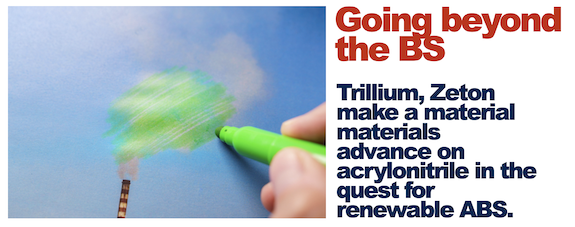Going beyond the BS: Trillium, Zeton make a material materials advance on acrylonitrile in the quest for renewable ABS.

News has arrived from Trillium Renewable Chemicals (www.trilliumchemicals.com of a partnership with Zeton to design the world’s first demonstration plant to convert plant-based glycerol into acrylonitrile, deemed “Project Falcon.”
Trillium is pioneering the development of a new chemical manufacturing process to produce acrylonitrile from glycerol.
The acrylonitrile backstory
OK, what exactly is acrylonitrile good for? The most relevant application we know of — and it’s a biggie — is a pathway to renewable ABS, or acrylonitrile butadiene styrene, which you would know as the material that constitutes a Lego brick.
ABS is one tough material, and it’s proven to be very tough to find a renewable alternative for. Not because the world does not have a pathway to renewable butadiene or styrene. Acrrylonitrile has been the major stumbling blocks in terms of production at scale — although making plant-based styrene is not notoriously cheap and renewable butadiene is a technology that Genomatica has been pushing along without the crescendo of support from chemical manufacturers that it deserves. More on plant styrene here.
One way to look at it is this. Because in the search for ABS there’s been no pathway to A, the whole search to date has been about a lot of BS. Now, we can get beyond the BS — that is, we are on to A, and with that, the world will be made safe for Legos, and plenty of other applications.
Yes, the ABS market is not everything, but it’s not nothing nothing. Lego said it would spend up to $200 million for renewable ABS. Perhaps news items like this announce from Trillium and Zeton will catalyze more action, faster on the ABS front. After all, ABS has a $31.93B market, says here, headed for $57B.
Now, getting from glycerol (C3H8O3) to acrylonitrile (C3H3N) is a pretty interesting proposition — it’s not completely obvious, but the good news is that the carbon is conserved, and essentially there’s some reduction of the oxygen and there’s nitrogen in there, courtesy of our low-cost friend, the atmosphere. No need to go hunting down additional carbon or hydrogen — bugaboos in any industrial process. In short, not an obvious one-pot no-brainer in terms of the work of the chemical engineers, but once you have glycerol and some free air, you have what you need in the raw material department.
The Zeton-Trillium connection
Zeton is the world leader in the design and fabrication of demonstration plants and small modular production plants. The Trillium-Zeton partnership kicks off the design phase of Project Falcon, which paves the way for low-carbon footprint apparel, toys, cars, medical gloves, planes, and many more products.
The project backstory
Following a $10.6M Series A financing round in December 2022 and $2.5 million award from the Department of Energy’s Advanced Manufacturing Office in June 2022, Trillium successfully built a pilot plant that produced acrylonitrile from glycerol. Trillium’s pilot plant continues to operate and will provide product samples to customers for validation. Information collected during these pilot trials will be used to design the Falcon plant.
Next steps
Operation of Project Falcon will be used to verify process economics and product carbon footprint at large scale. New focus will be given to achieving operational performance criteria (e.g., plant uptime), demonstration of key equipment in final form, and successful qualification as a supplier of acrylonitrile.
Reaction from the stakeholders
“We are thrilled to partner with Zeton in the next stage of our commercialization journey,” said Erik Scher, Trillium’s newly-appointed Board Chair. “Demonstrating Trillium’s technology at a larger scale will allow our customers to verify product quality at scale, a key milestone in our path to becoming a leading producer of renewable chemicals.”
“With its breakthrough glycerol to acrylonitrile technology, Trillium is leading the way in sustainable chemicals manufacture,” said Dr. Leisl Dukhedin-Lalla, President and CEO of Zeton, Inc. “Zeton is proud to have been chosen by Trillium to design the Falcon plant, and is looking forward to accelerating the commercialization of this technology by delivering this landmark project.”
Category: Top Stories














